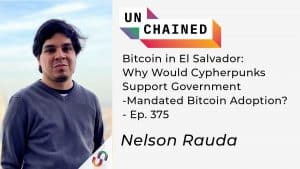July 19, 2022 / Unchained Daily / Laura Shin
Daily Bits✍️✍️✍️
- Snapshot added a “shielded voting” feature to allow DAO members to vote privately.
- The Dutch central bank fined Binance $3.4 million for operating within the Netherlands without authorization.
- Lido, a DeFi staking service, is launching liquid staking on Ethereum layer 2 networks.
- Coinbase has been approved to operate in Italy.
- Crypto exchange Gemini executed a second round of layoffs just seven weeks after cutting 10% of its workforce.
- Monthly NFT trading volume fell 74% between May and June.
- BlockFi is offering employee buyouts via a “voluntary separation program.”
Today in Crypto Adoption…
- The US Treasury could be open to allowing non-banks to issue stablecoins.
- Christie’s launched a venture fund to invest in web3 innovation.
- Time President Keith Grossman is bullish on NFTs but thinks the word NFT should “disappear from the lexicon,” according to CNBC.
The $$$ Corner…
- Modular Capital, a web3 hedge fund, raised $20 million.
What Do You Meme?
What’s Poppin’?
3AC Owes Billions to These Creditors
Teneo, the firm spearheading the liquidation of Three Arrows Capital (3AC), published multiple legal filings outlining the extent of 3AC’s outstanding loans and asking authorities in Singapore to recognize the liquidation proceedings.
According to the documents obtained by The Block, which are no longer available online, 3AC owes 27 companies roughly $3.5 billion. Notably, Genesis Asia Pacific Pte Ltd., a subsidiary of Digital Currency Group, is the largest creditor listed, having loaned $2.3 billion to 3AC. Other large creditors looking to see their funds returned through the legal process include Celsius Network, CoinList, and FalconX, which each lent between $35 million to $75 million in tokens to 3AC. (Interestingly, creditors also include 3AC co-founder Zhu Su, who is asking for $5 million, and Chen Kelly, the wife of 3AC co-founder Kyle Davies, who is seeking $65 million.)
Based on another report from The Block, it appears that some of these larger creditors are banding together to form a committee, including Digital Currency Group, Voyager, CoinList, Blockchain.com, and Matrixport as members.
The filings also gave more insight into the mismanagement of funds from 3AC. For example, in a thread summarizing the documents (which is linked to in recommended reads) crypto law expert Wassielawyer noted that the 3AC co-founders put a down payment on a massive luxury yacht while at the same time likely “defaulting on their lenders.”
This new information comes about two and half weeks after 3AC filed for Chapter 15 bankruptcy in New York. As of now, it does not appear the whereabouts of either Zhu Su or Kyle Davies is known.
Recommended Reads
1) Wassielawyer on 3AC
2) @marceaueth on how Rocket Pool might scale
3) Li Jin and Michael Mignano on technical standards and innovation
On The Pod…

Nelson Rauda, Salvadoran journalist for El Faro, comes to talk about the impact of Bitcoin in El Salvador, the needs of Salvadoran people, Bitcoin City and the Bitcoin Bond, and much more. Show highlights:
- Nelson’s story and how he began covering BTC
- what kind of politician and president Nayib Bukele was before BTC
- what the financial reality was for Salvadoran people before the implementation of BTC
- the reasons for the high rates of unbanked people in El Salvador
- how Bukele changed the monetary policy with what Rauda says was very little discussion
- why Rauda believes the BTC law is not meant for Salvadorans, but instead is a PR stunt
- how people reacted after the announcement of BTC as legal tender, and how it resembled the dollarization of the economy in 2001
- how Nelson did not even understand BTC at the moment of the announcement and how he says there was not an effort from the government to educate the population
- whether BTC was successful in attracting investments and tourism, and how there’s no hard data about it
- why Nelson believes Bukele was trying to hide the scandals when he adopted BTC
- whether BTC has been used as a PR stunt
- why bitcoiners are enthusiastic about an authoritarian government adopting BTC as legal tender
- how Bukele might be undermining his own authority by adopting BTC, a type of money that is not controlled by a state
- whether the Chivo wallet is a surveillance tool
- why Nelson believes BTC does not represent a solution for the needs of average Salvadoran people
- whether the $30 dollar initial gift to download the BTC wallet was seen as just another subsidy
- the status of Bitcoin City and how Nelson believes it represents the most spectacular PR stunt from Bukele’s administration
- how the expensive prices of electricity in El Salvador make the country not the best place for mining
- the significance of Bitcoin Beach
- what the BTC bond is, what Bukele tried to achieve with it, and why it has been postponed
- whether El Salvador will default on its debt and what the impact of the BTC price has on the national finances and on how Salvadorans perceive Bitcoin
- how Nelson believes people in El Salvador do not have political freedom and how it contradicts the narrative of financial freedom that BTC aims to provide
- what Nelson thinks about Bitcoin and whether governments should adopt it as legal tender
Book Update
My book, The Cryptopians: Idealism, Greed, Lies, and the Making of the First Big Cryptocurrency Craze, which is all about Ethereum and the 2017 ICO mania, is now available!
You can purchase it here: http://bit.ly/cryptopians




